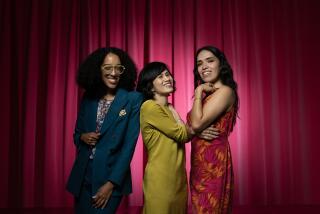Gay Film Fest Director Moving On : Movies: After presenting more than 1,400 films and videos to an audience of more than 210,000, Larry Horne looks back on 12 years with the annual event.
- Share via
As the 12th edition of the Los Angeles International Gay & Lesbian Film & Video Festival opens tonight at the Directors Guild, its founder-director Larry Horne will be stepping down to become a producer.
At 37, Horne can look back at having presented more than 1,400 films and videos to an audience of more than 210,000 during the festival’s 12-year history. In 1982, there were 29 films presented from seven countries; this year, there will be 242 offerings from 29 countries. The box-office take has grown from $6,780 to last year’s $105,000.
“It’s been personally a highly gratifying activity--my passion,” said Horne in an interview at his Beverly Boulevard office last week. “My driving force has been in having an impact upon people’s lives, and I’ve been almost maniacal about it. But now I’m ready to move on, to try for even more access on a different level.”
Morgan Rumpf, of Arts Inc., a nonprofit organization that provides technical assistance to nonprofit arts organizations, will succeed Horne on Aug. 8.
Then, Horne will be able to devote all his energies to launching, with a group of friends, Out Entertainment Group, an independent production and distribution company that will develop gay- and lesbian-themed material for video and cable as well as the big screen. It has already optioned for filming James Baker’s “Tim and Pete,” which Horne enthusiastically describes as “a gay ‘Thelma & Louise’--smart, sassy and mid-’90s.”
*
Horne said he has witnessed a tremendous change in attitude over the years toward the festival, both on the part of distributors and the public. “I went through a long period of constantly defining what we were, a festival featuring mainly independent productions and foreign films,” he said. “We were such an unknown quantity, people would actually ask if a gay and lesbian film festival was devoted to pornography!”
Horne used to complain loudly about the difficulty of getting distributors to contribute gay- and lesbian-themed products for the festival. But now, he said, “films have been easier to get in the last couple of years.” Four or five years ago, when the festival requested “Waiting for the Moon,” the Gertrude Stein-Alice B. Toklas movie, Horne says, “we got an outright no” from the film’s distributor, Skouras Pictures. “We didn’t get ‘My Own Private Idaho’ or ‘The Crying Game,’ but I got pretty far with ‘Philadelphia,’ (however) it went to the APLA for a benefit premiere. We now get nicer ‘no’s,’ not just bull.”
There could scarcely be a better indication of the festival’s coming of age than its landing of this year’s Cannes Film Festival sensation from Australia, “The Adventures of Priscilla, Queen of the Desert,” a giddy, hilarious yet poignant comedy about the experiences of three drag performers traveling across Australia’s rugged outback in a gaudily decorated bus.
The film has a real “La Cage aux Folles” crossover potential, and according to Horne was “easy to get.” Gramercy, the film’s distributor, told Horne “it wanted it in the festival.”
“Once distributors feared that their gay-themed films would be pigeonholed by being in the festival, but now some of our films, the non-threatening ones, attract some straights,” Horne said. “There’s no way of measuring this, but I do know last year straights came to see ‘Grief’ and ‘The Living End,’ especially.”
Horne was a UCLA graduate student in film history when he and a classmate, John Ramirez, now a professor of film at Cal State Los Angeles, returned from San Francisco’s 1981 gay and lesbian festival, thinking it was time L.A. had its own event.
With another classmate, Claire Aguilar, now KCET’s manager of broadcast programming, they approached UCLA Film and Television Archive director Robert Rosen and head film programmer Geoffrey Gilmore, who offered immediate support.
*
The late Gary Essert, co-founder of Filmex and later the American Cinematheque, lent crucial help, and the late Vito Russo, gay activist and pioneering historian on the representation of gays and lesbians in films, appeared at the first festival and provided early moral support.
In its initial three years the festival was held at UCLA, moving on to the Four Star Theater in 1985 and finally to the Directors Guild in 1988. “We made a lot of noise to have Christopher Street West--which presents the Gay Pride Parade and Festival every year--support us, and a group we formed in 1985 under their auspices got almost $20,000,” Horne said.
“They didn’t want to do it again because we broke even instead of making a profit. So in 1986 we formed a nonprofit organization, Bob Rosen signed on to the board and lined up other directors for us.”
By 1989, Horne--who had worked at the UCLA Film and Television Archive, at KCET (as a special programs director) and at the AFI’s Preservation Center--was able to work full time for the festival. Horne said he was grateful to Four Star proprietor Louis Federici for his modest rental fees but feels the festival didn’t come into its own until ending up at the Directors Guild. “It was in 1988 that the festival really took off,” Horne said. “We had a larger impact, bigger audiences and growing awareness of our existence. People feel secure in coming to the DGA and more than ever people are interested in discovering what gay culture is all about.”
* The 12th annual Los Angeles International Gay & Lesbian Film & Video Festival continues at the Directors Guild of America, 7920 Sunset Blvd., Hollywood, through July 17. Information: (213) 466-1767.
More to Read
Only good movies
Get the Indie Focus newsletter, Mark Olsen's weekly guide to the world of cinema.
You may occasionally receive promotional content from the Los Angeles Times.










